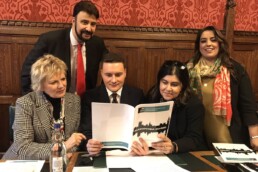The first rule for those in Islamic scholastic training, especially that of a philosophical nature has always been to cultivate the ability to leave emotionally charged rhetoric at the door. Whilst this remains incredibly challenging for most self-styled clerics, genuine thinkers demonstrate such aptitude – to maintain disapproval of certain ideas whilst dealing with them in a systematic and impartial fashion. Such is the mode of philosophical enquiry that has been held high, both in eastern and western forms of thought. David Hume, perhaps the greatest philosopher to write in the English language lamented of hollow rhetoric, ‘Disputes are multiplied, as if every thing was uncertain; and these disputes are managed with the greatest warmth, as if every thing was certain. Amidst all this bustle it is not reason, which carries the prize, but eloquence…’
However, this aptitude is greatly unappreciated. There is a pettiness about expertise and scholarship that exists amongst western Muslims that has gotten foolish and immature. Many amongst the laity disregard the station of actual learning, demoting the educated whilst propping up everyone else. There was once a time amongst believers, when public engagement required a level of technical knowledge, scholastic ability, and a decent command of language. Ideas would be articulated intelligently, contentions to those ideas would warrant a decisive but affable response; scholars would be expected to defend their views and accept being called out for inaccuracies. But now we seem to live in a time when anyone can crowd the field of slogans with inanity. Rather than being instructed, laymen are pandered to, producing a delusion of intellectual adequacy in the form of compounded ignorance (jahl murakkab), which says that you are ignorant but you stoutly believe otherwise. This misplaced confidence merely empowers people who refuse to believe there are specialists who might contradict them, nonchalantly dismissive in order to maintain an immoderately high regard for their own intellects and partisan viewpoint. For them, no one is considered an actual scholar, and so, everyone despite their varying degrees of learning is very much equal. This is not only a rejection of knowledge but also the sophisticated system of gaining knowledge, the effort put in, the notion of exploring and weighing knowledge, and developing ideas for practicable ends.
A superficial approach to determining authority
We are caught in a warped paradigm, where on one hand we continue as if there aren’t any seriously qualified personnel but then on the other accede to the reality where YouTube validates everyone’s credentials; a Qur’an reciter with a nice voice is somehow a theologian, an impassioned evangelist suddenly becomes a legal specialist. It is this superficial approach to determining our authorities that brings about the demise of proper expertise where glorified laymen, Google, and random web articles substitute insightful teachers and scholars of the faith. Even an acknowledgement of expertise has become heretical; apparently every layman holds the keys to scholastic enlightenment yet those who manage to put in determined effort are still apprentices. And if those insightful teachers and scholars offer some context when approaching theological or legal issues in a way that should alter our baseless thoughts or change the way we (worryingly) live it’s bound to be heresy. It’s as if we have come to reject the notion that a trained jurist or theologian is more likely to be right about something due to education, research and understanding than a mere adherent to the faith or someone with a little reading under the belt. In fact, one person knowing far more than others and reserving the moral and intellectual authority to issue a verdict in the realm of his or her expertise is an appalling thought; even to offer expert help is now considered by many to be the height of arrogance.
We have clearly misunderstood the notion of democratising authority, and rather than apply it to governance it has somehow strayed into realms that should normally be based on aptitude and qualification. This has led to the implication that everyone has a right to air religious opinion. Indeed God allows the agency of free will (to do as you want) but to argue that anyone may pontificate on religious matters isn’t quite the same. So don’t people have a right to do so? Well it depends what the opinion is based on. Some laymen are well versed in revelation or have a nominal understanding of sound religious reasoning; others are completely oblivious to what even makes them a Muslim. As long as there is some underlying intelligence to the undertaking then most scholars welcome discussion, but only if it is with a particular sense of decorum, in good faith, and those wanting to participate meet a certain level of competency. Such engagements are endeavours to inform the masses, to explore ideas in innovative ways, to inspire, and to provide points of reference for further thought. But that, however, is not an offer to antagonistically contest every minute point or premise that is offered. There is marked difference between challenging an idea and simply arguing, between seeking profundity on a matter and telling someone who has spent years researching and thinking deeply about an issue that they simply don’t know much.
The layman’s fallacy
[blockquote align=”none”]It is absolutely draining to have to start from the very beginning of every discussion and determine the simplest baseline of knowledge, and subsequently engage in farcical debates that tend to end with continuous demands for inconsequential references.[/blockquote]The problem with many laymen is that not only do they falsely believe that they have a valid argument but they also assume that they are adept at providing cogent systems of reasoning. Frequently, their initial premises are inaccurate depictions of reality and often, due to the layman’s incompetence in acquiring the most basic level of knowledge, scholars are left having to spell out the obvious which for the best part, they simply can’t be bothered doing. For this reason many scholars tend to avoid engaging altogether – it is absolutely draining to have to start from the very beginning of every discussion and determine the simplest baseline of knowledge, and subsequently engage in farcical debates that tend to end with continuous demands for inconsequential references. It is particularly frustrating where people reject sound scholastic deductions merely because it conflicts with previously held beliefs (no matter how baseless or asinine) or because a foreign scholar hasn’t said it elsewhere (either via a translation or articulated with a foreign accent and bad English). In fact it’s interesting that Muslims in other countries tend to proudly publicise their people of religious learning yet we hold our own in contempt. The inferiority complex is astounding; we happily ascribe ‘shaikh-ness’ to someone with a foreign accent who does little more than rant and offer nothing constructive by way of revelation, law and faith, yet demote those who display a substantial level of sagacity and religious insight.
The rise of the sloganeers and ‘speakers’
Nevertheless, the problem doesn’t only lie with laymen; we find that most sloganeers have abandoned all moral and intellectual integrity. They abuse the scholastic method almost as a matter of routine and where they cannot overcome a well-structured idea with equal sagacity they smear or exaggerate. Scholars do not debate sloganeers who substitute a simple cherry-picked verse or hadith framed as a some profound scholastic reference for ‘the haq’ (truth). It should be worrying that one case be rooted in practicality, wide reading, observed phenomenon, and reasoned scriptural evidence – and the other a reversal of the truth. Often speakers attempt to make engagements personal, offering examples from a bunch of moral stories in a bid to make their narrative likeable and seem reasonable. With the audience enamoured they invoke the dalil. The reason this works is because such people are either YouTube personalities or ‘speakers’ at events organised by known organisations who use this prestige to give the impression of authority. Even when the illiteracy of these speakers is exposed they still emerge with their reputations intact because most people would rather trust arbitrary credentials than go to the trouble of investigating the veracity of statements and opinions.
Most things in our lives come down to testimony. People take our word on things based on trust, experience, study, and a demonstration of scholarship. Where these things themselves are misunderstood the laity are left with little to judge by. There was a time when the laity were simply an audience, and whilst it can be argued that wider participation somewhat prevents knowledge remaining abstract in ivory towers, greater participation seems to have led to the absurd conclusion that learning is meaningless and access to suspect translations of unrelated material composed by parochial clerics (read: glorified translators) dictates that every opinion has equal weight. Ultimately, this will continue to have a disastrous impact on the relationship between astute scholars, the Muslim community, and the rest of society. As is often the case, scholars tend to avoid people and simply turn to engaging with one another. Not only is it bad for the religious, social and intellectual development of the Muslim community, but also the preservation and progression of sensible faith.




